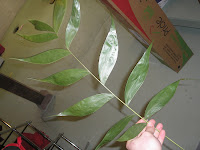Eco Palms: The Review
 So, as I blogged about (or was it Facebook?) earlier, my church decided to go with the Eco-friendly Palm leaves this year for Palm Sunday. Someone in my parish who teaches Environmental Sciences at SDSU found some resource through the Presbyterian Church that you could order Eco-friendly Palms that are fair trade.
So, as I blogged about (or was it Facebook?) earlier, my church decided to go with the Eco-friendly Palm leaves this year for Palm Sunday. Someone in my parish who teaches Environmental Sciences at SDSU found some resource through the Presbyterian Church that you could order Eco-friendly Palms that are fair trade.I am sometimes a little dubious of "fair trade" stuff, as it can be just another money making scheme to profit off gullible Christians, or else self defeating as such economic tactics can actually have the reverse effect and inflate a 3rd world market, thereby making local growers more dependent on White, Western consumers and not more independent because it can create an artificial market where growers are getting more than their crop is worth on an open market and thereby get dependent on it. Thus, when fickle 1st World Customers start buying elsewhere or local political instability comes into play, the artifical market collapses, and the farmers are left in worse shape than they began in because the guise of "fair trade" has made them more dependent and not less. This doesn't always occur, but it is a danger that can be created by well meaning but economically simplistic "Fair Trade" companies that don't have a grip on large scale agronomy.

My parishioner did his research, even calling up some colleagues at the University of Minnesota who had done ecological studies in the Central American country of origin where the Palms were harvested, and assured me the company was not creating an artificial bubble market. They gave the company a thumbs up. The palms in question were also cheaper than the normal palms my parish orders from previous years, so I gave the go ahead. We had plenty of left over ashes from Ash Wednesday, so if they are a bust when they dry, we would still have ashes for next year. (For my liturgically handicapped readers, the Palm leaves from Palm Sunday are dried and burned the next year for the ashes for Ash Wednesday.)
As you can see, the Palms are very nice, but not the normal "Florida Palm Tree" style that end up in many churches. If your church's big thing is to fold the palms into those little crosses in Sunday School, they are probably not going to work for that. However, they are greener, and probably more like the Palm leaves you actually see in the Middle East. So, historically, I would argue they are closer to the originals, as they actually come from arid climate Palm trees.
This batch was delivered on Tuesday, and they stayed green nicely until Sunday. I haven't heard any complaints yet from parishioners, but I imagine since they are not the shape that we've always used before (We are Episcopalians, you know, and we've never done it that way!) some people were probably not all that happy. I think this was offset by the facts that they were Eco friendly (something this parish is into) as well as cheaper.
I liked them, personally, as they are much greener than the normal variety that look like long cat grass and not palms. I found the abundance of green to be quite striking as I had to shovel snow before church started. They are also more maleable, so they were easily added as decoration to various parts of the nave and sanctuary like the side altar and the pulpit.
Overall, I was quite pleased with the look and feel of the Eco Palms. They were delivered on time and were nice and fresh. Depending on how they dry and burn for ashes, I would recommend buying them again next year.

Comments